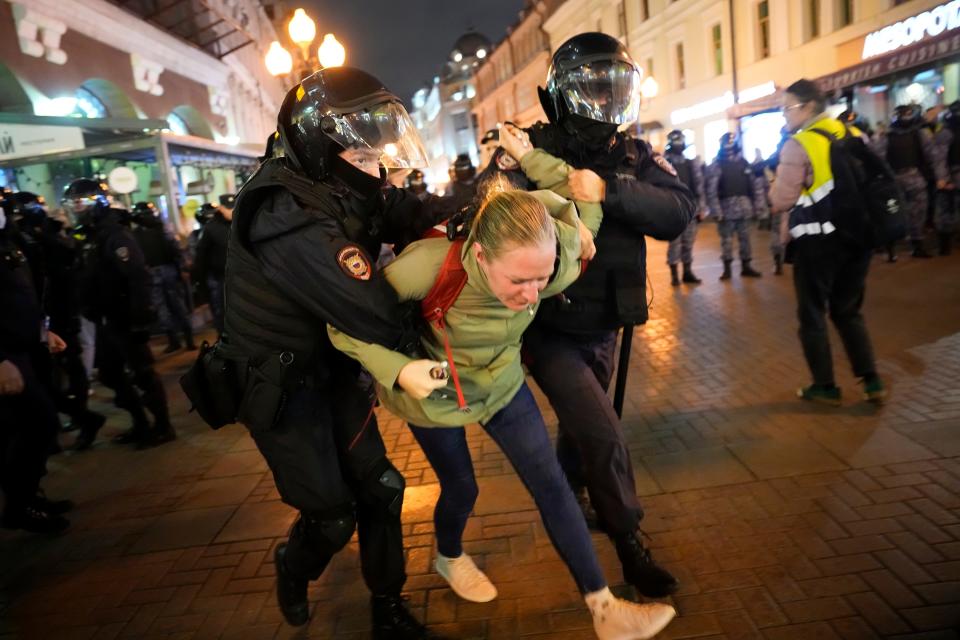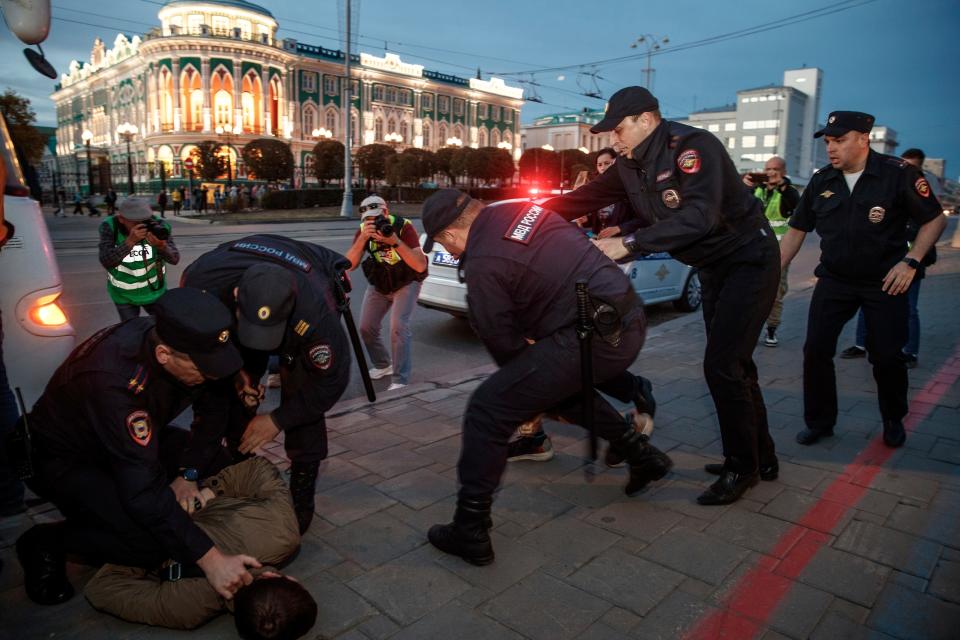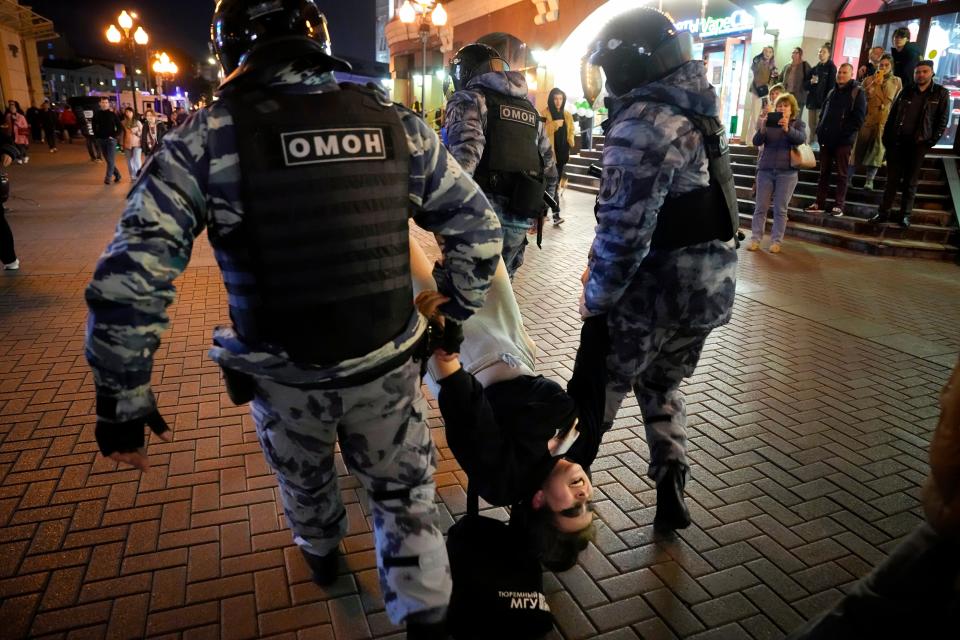At anti-war protests in Russia, fears for the drafted as 'cannon fodder' and a brutal response by police
- Oops!Something went wrong.Please try again later.
Olga Zhgun couldn’t stay silent.
Zhgun, a 45-year-old film director, marched through the streets of Moscow with other anti-war protesters Wednesday night, just hours after Russian President Vladimir Putin announced plans to mobilize another 300,000 reservists to bolster his troops fighting in Ukraine.
Before the night was over, Zghun would end up in the back of a police truck, bleeding, after a police officer smashed her head with a club.
“When Putin called for the mobilization, I knew I could not stay indifferent,” Zhgun said. “It was a turning point. Somebody had to protest. Otherwise, the world would think we are all supporting this.”
Across Russia, demonstrators spilled into the streets this week in the country’s first nationwide anti-war protests since Russian troops invaded Ukraine back in February. The protests started in the Siberian and Transbaikal regions shortly after Putin’s announcement and spread to the Ural Mountains and European parts of Russia throughout the night.
HOW IT STARTED: Biden details new Russian sanctions as death toll climbs in Ukraine
THE ENTIRE WORLD IS LOSING: Six months into the Russia-Ukraine war, a look at where we go from here.
Thousands of activists marched in Russia’s major cities, chanting: “No to war!” “No to mobilization!” “Russia without Putin!”
Russia’s airports, train stations and highways were jammed as draft-age men fled the country to avoid being called into service. Many traveled to Central Asia, Turkey or Armenia, but the prices for flights tripled or quadrupled overnight, making them unaffordable for many Russian reservists.

A risky strategy
Western analysts said the demonstrations and the exodus are clear signs that Putin is struggling in Ukraine and at home.
“This is confirmation that the war is not going well and that Putin has not really mobilized the population in support of this war,” said Will Pomeranz, director of the Wilson Center’s Kennan Institute, a Washington-based think tank dedicated to Russian and Eurasia research.
Confronted with steep battlefield losses, expanding front lines and a conflict that has raged longer than expected, the Kremlin has struggled to replenish its troops in Ukraine.
Until Putin’s callup of troops, the first since World War II, many Russians had been detached from the war, Pomeranz said.
Russia-Ukraine war: Russians protest, flee country as Putin's military mobilization begins; Blinken urges end to nuclear threats
“There hadn’t been a real call for sacrifices of the Russian population to engage in this war,” he said. “This mobilization was a test of Putin’s propaganda. And I think that, clearly, for those Russians who are now more vulnerable to being called up into the military, they do not want a part of this war.”
Putin's mobilization of additional forces is a risky strategy, said Paul Stronski of the Carnegie Endowment for International Peace, a nonpartisan think tank headquartered in Washington.
The war in Ukraine "was popular when Russia was winning, and it was popular when young Russian men were not at risk of being sent to war," said Stronski, a senior fellow at Carnegie's Russia and Eurasia Program
By sending more men into the conflict, "they're stepping into a situation that could certainly backfire," he said.

SPREADING MISINFORMATION: Russia’s ‘firehose of falsehood’ in Ukraine marks latest use of propaganda to try to justify war
'Awful times'
More than 1,300 anti-war protestors have been arrested in cities across Russia, including Moscow and St. Petersburg, according to the independent Russian human rights group OVD-Info.
In St. Petersburg, an opposition movement of young democratic activists called the Spring led protesters to St. Isaac’s Square. Special mobile police units were waiting. Officers beat the activists with clubs, forced some of them to their knees and dragged them to police buses.
Some detainees were handed draft papers ordering them to report to local enlistment offices at 9 a.m. the following day. In Moscow, the prosecutor’s office warned that organizing or participating in protests could lead to up to 15 years in prison.
For Boris Vishnevsky, a local deputy, the political climate in Russia is deeply disturbing.
"Awful times,” he said.

Back in 1988, Vishnevsky participated in rallies by the Leningrad People’s Front that inspired the Perestroika political reform movement. But now his hopes for democracy in Russia are fading.
“Even in my worst nightmare, I could never imagine a mobilization for the war in Ukraine,” Vishnevsky said. “Russia has not seen mobilizations since 1941. If only we could see Putin, the only words we would have to say would be: Stop the fire.”
By midnight Wednesday, police had detained 444 people in St. Petersburg and announced a special operation called “Krepost,” or fortress. Vishnevsky called police stations, asking that public officials let defense lawyers in to see their detained clients. Everywhere he called, the answer was no.
When he asked police why they conducted the fortress operation, the answer shocked him: “Because the detainees could capture the room with weapons.”
PIERCING THE PROPAGANDA VEIL: US, Schwarzenegger, hackers give Russians uncensored view of Ukraine war
Soldiers as 'cannon fodder'
Dmitry Tolkachev, a 28-year-old political scientist who opposes killing people in war, took a bus to Finland with a short-term visa in his passport on Thursday. The visa will allow him to remain in Finland for up to 90 days.
“I respect the brave protesters a lot,” Tolkachev said. “But in Russia, one can die or go to jail for truth. I cannot do this.”
The bus Tolkachev took across the border into Finland was filled with 25- to 45-year-old men escaping the draft, he said. He suspects Russian leaders will use corruption to protect their families from the mobilization.
“In this respect, Russia’s political regime is similar to Central Asian states,” said Tolkachev, who as a university student researched and wrote about queer issues.

Many in Russia wondered how the Kremlin was executing the combat plan in Ukraine and how long the drafted soldiers would be trained for the war.
Videos of men saying goodbye to their loved ones flooded social media. Human-rights defenders reported mobilizations in remote villages in Buryatia, a poor Russian republic nearly 3,000 miles from Moscow.
Putin described the call-up of forces as a “partial mobilization,” but Stronski said it appears to be much broader.
“We’ve seen college-aged men being walked out of their classrooms” and forced into service, he said.
Putin’s shadow private army, Wagner Group, continued recruiting convicts around Russian prison colonies.
Marat Gabidullin, a Wagner veteran, refused to join the military forces and fight in Ukraine. Gabidullin is angry with the men in power.
“They are stubborn and dumb,” he said. “They send young people to wars, stealing their future... They will not train the army in such short mobilization period, so these drafted men are going to turn into cannon fodder.”
Stronski, too, questioned whether the additional troops would benefit Russia's war machine.
“You don’t need men – you need men who are trained to fight,” he said. “Some of these people are just being taken from their workplace or being taken from their classroom and having just a couple of weeks of training before they are sent to the front. They’re not necessarily going to be the same fighting force. How reliable will they be?"
“This might not be the solution to Russia’s military troubles,” he said. “We could just be sending Russian men to their death.”
PUTIN 'WON'T STOP' WITH UKRAINE: Why Americans should care about Russia's aggression against its neighbor
'History is repeating itself'
The day after she was attacked by police, Zhgun went to the doctor to treat her head wound. She learned she had a concussion.
Zhgun, who has been joining political rallies since the first Russia Without Putin protest in 2001, has had trouble finding a job since the fighting erupted in Ukraine. Employers did not like her anti-Putin statements on social media.
Zhgun fears for her country.
“I am Jewish,” she said. “I can see that the history is repeating itself once again. Something awfully scary is happening in Russia.”
Contributing: The Associated Press
'WAR CRIMINAL': As Biden gets personal with Putin, US, Russia relationship hits a dangerous crisis
This article originally appeared on USA TODAY: Russian anti-war protests highlight trouble for Putin's war in Ukraine

